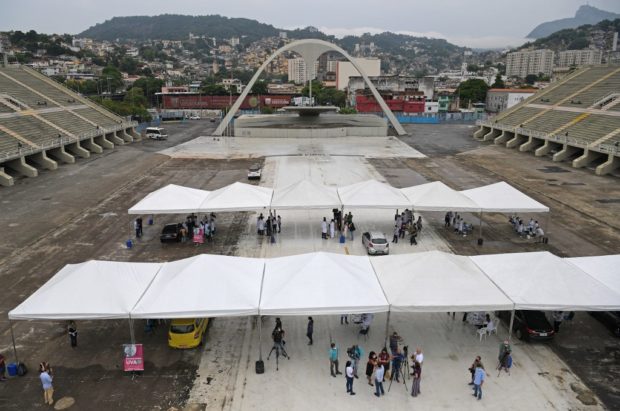
Health workers wait to administer doses of Coronavac vaccine to elderly patients at a drive-thru vaccination point at the Sambadrome Rio Carnival venue, Rio de Janeiro, Brazil on February 13, 2021. Photo by CARL DE SOUZA / AFP
RIO DE JANEIRO — Rio de Janeiro would normally be kicking off its famed carnival now, but instead of booming drumlines, glittering floats and barely clad dancers, the Brazilian city’s “Sambadrome” is hosting a Covid-19 vaccination drive this year.
The pandemic forced Rio authorities to cancel carnival for the first time in 109 years, leaving the iconic beach city full of “saudades” — a Portuguese word that roughly translates as “longing” — for its biggest party of the year.
“For everyone who loves dancing and playing samba, for the entire Afro-Brazilian population, this is a very difficult time,” said Nilcemar Nogueira, founder of Rio’s Samba Museum, an homage to the percussion-driven musical style at the heart of carnival.
“Instead of a party, we’re mourning our dead,” she told AFP at the museum, where rather than partying a small group of musicians paid a simple a-capella tribute Friday to the 237,000 victims of Covid-19 in Brazil — the second-highest death toll worldwide, after the United States.
One of the songs was “Samba, agoniza mas nao morre” (samba suffers but doesn’t die), by 96-year-old composer Nelson Sargento, who was there in a wheelchair for the ceremony, freshly vaccinated against Covid-19.
Nearby, at the Sambadrome — the stadium where Rio’s top samba schools face off in the annual carnival parade competition — the empty stands were silent, though the avenue that runs down the middle was bustling with activity.
City officials have turned the venue into an impromptu vaccination center. Among the first to be vaccinated Saturday was veteran samba composer Monarco, 87.
“All the elderly should come get vaccinated,” he said.
“I’m missing my friends from the Portela samba school old guard” who died of Covid-19, he added.
“I’m missing (composer) Aldir Blanc and (samba singer and instrumentalist) Ubirany.”
Sequins out, masks in
On Friday, the Sambadrome hosted a bittersweet take on an annual carnival ritual.
Instead of handing the key to the city to the portly and jovial “King Momo” — the “ruler” of the carnival festivities — Mayor Eduardo Paes symbolically gave the key to a pair of health workers.
Their white lab coats and surgical masks stood in stark contrast to Momo’s sequined crown and colorful carnival get-up.
“We’re not holding carnival this year because we want to save lives,” said Paes.
Brazil is also cracking down on “blocos,” the street parties that usually draw millions of revelers throughout the carnival season.
Rio, home to the biggest blocos in the world, has deployed more than 1,000 police to keep people from partying this week.
Penalties for violating the ban include up to a year in prison, but that has not stopped numerous clandestine parties.
Brasilia, the capital, imposed a fine of 20,000 reais ($3,700) for partying, while Sao Paulo, Brazil’s biggest city, rolled out a program of 380 virtual events, such as online blocos, samba workshops and video conferences for those experiencing carnival withdrawal.
TV Globo, Brazil’s biggest broadcaster, which usually devotes wall-to-wall coverage to carnival, will instead be replaying 28 of the greatest parades Sunday and Monday, the nights the samba school competition would have been held.
Carnival usually draws millions of tourists from around Brazil and the world to Rio.
Last year, it brought an estimated $750 million to the city.
This year, all levels of the carnival economy are feeling the pain.
The cancellation left hundreds of samba school employees out of work — the small armies of costume designers, mechanics, choreographers, dancers and others who usually prepare the sumptuous carnival parades.
Hotels, which are usually full this time of year, meanwhile report occupancy of just 50 percent.